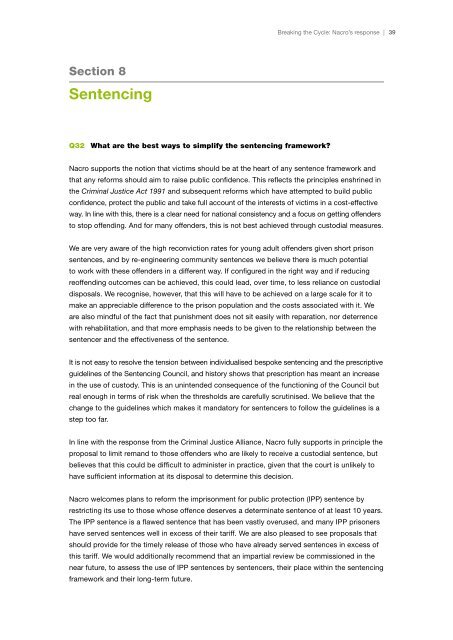Nacro's response to Breaking the Cycle Green Paper
Nacro's response to Breaking the Cycle Green Paper
Nacro's response to Breaking the Cycle Green Paper
Create successful ePaper yourself
Turn your PDF publications into a flip-book with our unique Google optimized e-Paper software.
<strong>Breaking</strong> <strong>the</strong> <strong>Cycle</strong>: Nacro’s <strong>response</strong> | 39Section 8SentencingQ32 What are <strong>the</strong> best ways <strong>to</strong> simplify <strong>the</strong> sentencing framework?Nacro supports <strong>the</strong> notion that victims should be at <strong>the</strong> heart of any sentence framework andthat any reforms should aim <strong>to</strong> raise public confidence. This reflects <strong>the</strong> principles enshrined in<strong>the</strong> Criminal Justice Act 1991 and subsequent reforms which have attempted <strong>to</strong> build publicconfidence, protect <strong>the</strong> public and take full account of <strong>the</strong> interests of victims in a cost-effectiveway. In line with this, <strong>the</strong>re is a clear need for national consistency and a focus on getting offenders<strong>to</strong> s<strong>to</strong>p offending. And for many offenders, this is not best achieved through cus<strong>to</strong>dial measures.We are very aware of <strong>the</strong> high reconviction rates for young adult offenders given short prisonsentences, and by re-engineering community sentences we believe <strong>the</strong>re is much potential<strong>to</strong> work with <strong>the</strong>se offenders in a different way. If configured in <strong>the</strong> right way and if reducingreoffending outcomes can be achieved, this could lead, over time, <strong>to</strong> less reliance on cus<strong>to</strong>dialdisposals. We recognise, however, that this will have <strong>to</strong> be achieved on a large scale for it <strong>to</strong>make an appreciable difference <strong>to</strong> <strong>the</strong> prison population and <strong>the</strong> costs associated with it. Weare also mindful of <strong>the</strong> fact that punishment does not sit easily with reparation, nor deterrencewith rehabilitation, and that more emphasis needs <strong>to</strong> be given <strong>to</strong> <strong>the</strong> relationship between <strong>the</strong>sentencer and <strong>the</strong> effectiveness of <strong>the</strong> sentence.It is not easy <strong>to</strong> resolve <strong>the</strong> tension between individualised bespoke sentencing and <strong>the</strong> prescriptiveguidelines of <strong>the</strong> Sentencing Council, and his<strong>to</strong>ry shows that prescription has meant an increasein <strong>the</strong> use of cus<strong>to</strong>dy. This is an unintended consequence of <strong>the</strong> functioning of <strong>the</strong> Council butreal enough in terms of risk when <strong>the</strong> thresholds are carefully scrutinised. We believe that <strong>the</strong>change <strong>to</strong> <strong>the</strong> guidelines which makes it manda<strong>to</strong>ry for sentencers <strong>to</strong> follow <strong>the</strong> guidelines is astep <strong>to</strong>o far.In line with <strong>the</strong> <strong>response</strong> from <strong>the</strong> Criminal Justice Alliance, Nacro fully supports in principle <strong>the</strong>proposal <strong>to</strong> limit remand <strong>to</strong> those offenders who are likely <strong>to</strong> receive a cus<strong>to</strong>dial sentence, butbelieves that this could be difficult <strong>to</strong> administer in practice, given that <strong>the</strong> court is unlikely <strong>to</strong>have sufficient information at its disposal <strong>to</strong> determine this decision.Nacro welcomes plans <strong>to</strong> reform <strong>the</strong> imprisonment for public protection (IPP) sentence byrestricting its use <strong>to</strong> those whose offence deserves a determinate sentence of at least 10 years.The IPP sentence is a flawed sentence that has been vastly overused, and many IPP prisonershave served sentences well in excess of <strong>the</strong>ir tariff. We are also pleased <strong>to</strong> see proposals thatshould provide for <strong>the</strong> timely release of those who have already served sentences in excess ofthis tariff. We would additionally recommend that an impartial review be commissioned in <strong>the</strong>near future, <strong>to</strong> assess <strong>the</strong> use of IPP sentences by sentencers, <strong>the</strong>ir place within <strong>the</strong> sentencingframework and <strong>the</strong>ir long-term future.
















